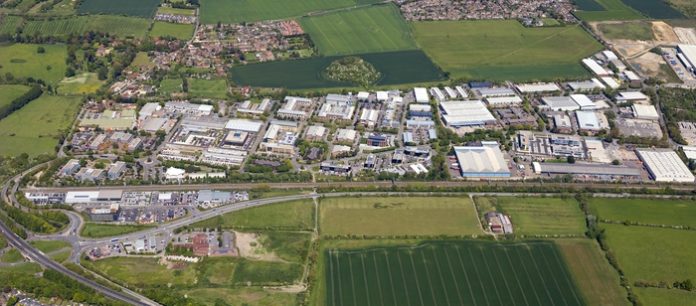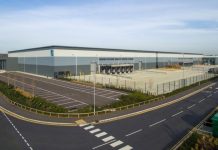Following an extensive 12-month research and engagement programme with occupiers, local residents and stakeholders, MEPC has created an emerging 20-year vision with the potential to bring Milton Park’s workforce to 20,000. MEPC worked with global master planning experts Perkins+Will to create the vision, which is set to transform one of the UK’s leading science and technology parks into a global hub of innovation.
Milton Park is currently home to over 250 companies, employing 9,000 people, including fast-growing Oxford University spinouts such as biotech unicorn, Immunucore. And fusion energy pioneer Tokamak Energy who spun out of the Culham Centre for Fusion Energy.
The exciting plans will eventually bring the total sq ft at Milton Park to over 4 million sq ft, all within its existing Local Development Order (LDO) planning boundary. Milton Park’s LDO will play an important part in the 2040 Vision plans as it streamlines the planning permission process, allowing applications within certain parameters to be approved within ten days. Older units and earmarked development land across the site will be replaced overtime with new and refurbished office, laboratory, high-tech and amenity space, including potential plans for a sports facility that will be open to everyone working at Milton Park and the surrounding community.
The 2040 Vision Masterplan will make more efficient use of the existing 300-acre site, with 41 percent of new space focused on creating world-leading labs. The Vision plans will be set around walkable neighbourhood environments that prioritise accessibility, connectivity and wellbeing. The plans will play a crucial role in assisting local authorities to deliver the Oxford Industrial Strategy and contributing to the area becoming a global leader in science, technology and high-tech engineering.
The Vision work completed at Milton Park will change how business parks are perceived by modernising design, creating a flexible and adaptable framework for future development and improving amenities to boost wellbeing.
Perkins+Will focused on six key design principles to establish the 2040 Vision over the next 20-25 years. These were:
Access – Access is fundamental to the masterplan, creating new connections through the park to support more pedestrian and cycle traffic, while paving the way for autonomous vehicles and future mobility choices.
Stewardship – Milton Park’s green space has been voted its most popular feature by three quarters of people taking part in the engagement survey. Maintaining the natural beauty and extending the green space was a design priority.
Identity – Creating a series of walkable neighbourhoods throughout Milton Park was key to the design process, with the intention of making the park a more community-focused and interactive space for both people and businesses.
Experience – The user experience is a priority to ensure that companies, employees and visitors enjoy their time at Milton Park. To do this requires legible wayfinding, pedestrian routes and travel connections within the park and the wider region.
Adaptability – With the rapid rate at which many companies at Milton Park grow, the design of the park must strategically anticipate the growth of companies, the type of companies and how they will use future office and lab space.
Implementation – In order to help Milton Park flourish, Perkins+Will have used a set of intuitive guidelines that set out how each phase can be brought to fruition, while respecting incumbent businesses and their business requirements. Engagement with the community and working groups will also continue.
Designing business parks that foster scientific and technological growth will ensure that Britain maintains its place as a leading knowledge economy, supporting innovation and businesses with high growth potential.
Philip Campbell, commercial director at MEPC said:
“The Milton Park 2040 Vision has been a fantastic project to work on. It has been amazing to work with so many great people to make it happen. One of the most important things for us was engagement with occupiers and the local community – ensuring we created a shared vision. The research undertaken by Perkins + Will as part of the process has been second to none and has really pathed the way to these emerging plans.
We’re looking forward to working through the connectivity and development phases over the coming months and years. And to creating a place for businesses to continue to thrive, but also a place to be enjoyed by the local community.
With ongoing engagement and regular monitoring, together with the community and local authorities, we can create the next innovation district of the future. We’ve worked closely with these groups already, and I would like to thank them for their immense contribution towards shaping the future Vison of Milton Park, which will benefit the whole of Oxfordshire.”
Peter Baird, associate at the London office of Perkins+Will, said:
“Business parks need to evolve to keep up with demographic, economic and social changes. MEPC’s desire to overhaul outdated perceptions has allowed us to rethink everything and masterplan a new district that can encourage innovation and wellness; acting as a hub for world-leading talent.
“The 2040 Vision will provide the framework that business parks across the country can follow, dramatically changing the way in which they are they are utilised and perceived in the UK. Our design seeks the communicate the future of Milton Park as a global science and technology hub and will, over time, offer passers-by glimpses of what the future of business parks and innovation looks like.”
Dr David Kingham, co-founder at Tokamak Energy and member of Milton Park 2040 Vision advisory group, said:
“We have gone from six people to 100 in six years and are looking to more than double our headcount over the next two years. Just as MEPC has developed a 20-year vision for growth, so too do many of the spinouts and high growth businesses here. The critical thing is having a plan that enables occupiers to grow and move easily on the Park as their business accelerates.
“The clustering effects of hi-tech business are very significant and if you don’t have the flexibility of premises to accommodate what can be quite unusual, fast-growing companies, they will simply go somewhere else in the world or just fail. Clusters generate lots of effects that all combine to support growth. You can clearly see this in the biotech cluster around Milton Park: High value equipment is able to be shared by different companies, enabling firms to have access to facilities that would otherwise be out of reach. Meanwhile, there is a skill-base of scientists and engineers who may work for several companies over many years, which is good for the employees and good for the employers.
“Tokamak Energy has a bold business plan to develop fusion energy in time to tackle the growing threat of catastrophic global warming. We are tackling a huge technical challenge and it is only possible in a location with relevant clusters of expertise – superconducting magnets and fusion energy in our case. The availability of suitable premises, and the ability to expand quickly, is then crucial.
“As an occupier and before I came to Milton Park my experience of property companies was based on a feeling that they considered the interests of their shareholders ahead of those of as their tenants. In my view smart landlords should see tenants as customers while their shareholders enjoy better returns by viewing it as a service business – not just an dry investment. This creates the right mindset for sustainable growth and that’s why so many companies find Milton Park to be a great place to grow.”




















